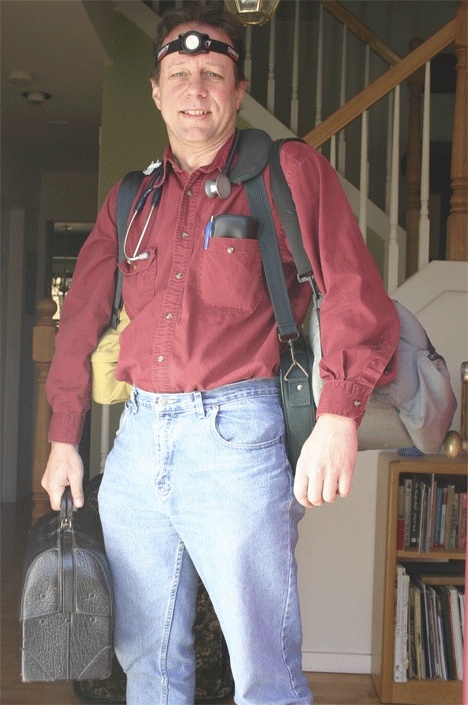Imagine yourself in your sickbed.
You need medication but that means overcoming the monumental task of getting your doctor to see you right away in order to get a prescription and then dragging your sick self to his office and then to the pharmacy before getting back to the relief of your bed.
Dr. Thomas W. Harris is changing that scenario with his new business South Whidbey Housecalls.
As if heaven sent, Dr. Harris will come to you.
Harris exudes a gentle disposition that would seem the best sort of bedside manner with which to visit someone’s bedside. As a board-certified osteopathic family practice physician with 13 years of experience, Harris said he wanted to get back to what being a doctor of osteopathy is all about.
“I’m motivated by wanting to practice medicine on a more grounded level,” Harris said. “And I want to be able to help people who have it the hardest.”
There are two “mainstream” medical professions in the United States whose members have comparable training, political organizations and unlimited practice rights in all 50 states: MDs, medical doctors, and DOs, doctors of osteopathy.
Osteopathy has its roots in the midwest in the 1870s when Dr. A.T. Still sought to find a better way to practice medicine after helplessly watching several of his children die in a devastating influenza epidemic.
Still studied the bones and muscles of the body and formulated a system of manual medicine with the focus of enhancing the body’s innate healing capabilities.
After enjoying initial success in its uniqueness, the DO profession gradually followed a course that would ultimately lead to the recognition of osteopathic physicians as equals to their MD colleagues in medical practice today.
A doctor of osteopathy is trained to practice a “whole person” approach to medicine, instead of just treating specific symptoms or illnesses.
Osteopaths use what is called osteopathic manipulative treatment in which the doctor uses his hands to diagnose illness and injury and to encourage the body’s natural tendency toward good health.
The focus on preventative care combined with any and all available medical options, makes osteopathy some of the most comprehensive care available in medicine today, Harris said.
And because of advancements in technology, the gadgetry used in medicine to treat patients is now more compact and transportable compared to the large, heavy machines that were used years ago.
Harris carries one old-fashioned doctor’s bag that belonged to his wife’s grandfather whom he learned was also an osteopath. But being a doctor on the go, he is equipped with modern gear as well.
Into several small, ready-to-go bags, Harris has created a veritable doctor’s office on wheels which makes it easy for him to see patients just about anywhere.
Harris showed off a treasure trove of tools, like an instant lab to draw blood complete with centrifuge; a supply of generic drugs of all types which eliminates a patient’s need to go to the pharmacy and which keeps the cost of the most common drugs under $10; a trauma bag with syringes, cold packs and everything needed for laceration repair and even biopsies; a nebulizer; an electrocardiograph which plugs into Harris’ laptop for easily transmitted results to any hospital; a HemoCue for testing blood; a glucometer; a pulseoximeter and a blood pressure cuff, all digitally-advanced and ready to transmit results to hospitals or labs.
For the past three years Harris has been working at the Everett Clinic with the typical pool of doctors who, like most clinics today, must see an average
20 to 30 patients per day to keep the clinic solvent.
Harris, however, realized there must be a better way to treat people.
He had read about a group of doctors in New England who had started a grassroots movement to change the “as many patients as we can” mentality that is standard for clinic docs.
The doctors were interested in a more healthy approach to seeing patients such as spending more time with each patient, seeing patients in their own environment and eliminating the overhead expense of having an office.
Harris said that with the advent of the Internet, making house calls makes sense.
He has everything he needs in his home office to take care of the administrative end of treating people like phone, fax, copier and computer.
“The Internet is this great infrastructure and now we have to figure out how to use it to our advantage,” he said.
To that end, doctors now have medical portals available to them for a fee that allows them to consult with their patients online. If a doctor signs up, established patients who may be on the road or who for any reason can’t be seen at home, can get a consult online.
Harris said he will definitely be on board with such a Web connection once he is established.
Although patients will be required to make their own insurance claims when using South Whidbey Housecalls, Harris will have Medicare available.
“I feel an obligation to use that system as it is a lifeline for some people,” he said.
Harris is also interested in collaborating with the home healthcare system that is already in place and to serve as a resource to other doctors who may not be readily available to all their patients at any given time.
“My inspiration to start this practice grew out of personal reflection at a time of dealing with illness and death in my own family,” Harris said.
“My hope is to keep that heart-centered focus in all that I try to accomplish and to encourage others to find the same heart-centered focus in confronting health concerns.”
Go to www.southwhidbeyhousecalls.com or call Harris at 320-2987 for information about South Whidbey Housecalls.


